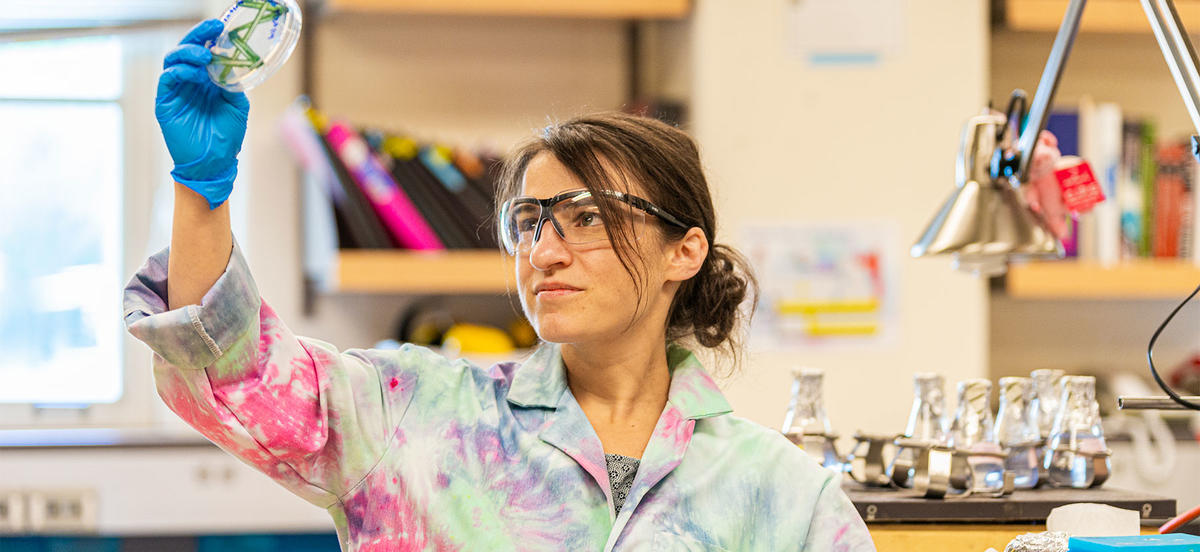Lou Charkoudian Earns National Institutes of Health Award

Associate Professor of Chemistry Lou Charkoudian '03 has earned a $297,992 grant over the next three years from the National Institutes of Health. Photo by Patrick Montero.
Details
Building on earlier NIH-funded work that engaged 40 undergraduate researchers, the associate professor of chemistry will continue her acyl carrier protein research thanks to a new $297,992 grant.
In 2016, Associate Professor of Chemistry Lou Charkoudian ’03 earned a National Institutes of Health award for her research into the motions of acyl carrier proteins (ACPs). These proteins, which are found in microorganisms such as bacteria, are important parts of the naturally occurring protein assembly lines that make molecules that are repurposed for pharmaceuticals such as anticancer agents and antibiotics. That research, which involved collaborations with Professor of Chemistry Casey Londergan, Professor of Biology Karl Johnson, and 40 undergraduate students, resulted in seven publications and a provisional patent.
"First, we developed probes that act as ‘helmet cameras’ to tell us about the local environment of the ACP or biosynthetic intermediates—or 'cargo'—tethered to the ACP,” said Charkoudian. "Second, we developed probes that catch the ACP in action with other proteins in the assembly, locking the two proteins, which normally only transiently interact, together. The latter enables us to study important ACP-protein interactions on a molecular level."
The NIH recently funded a renewal of this work, awarding Charkoudian a $297,992 grant over the next three years.
"We are now using the tools we developed in our first funding cycle to understand how the molecular intermediates tethered to the ACP drive how the ACP interacts with other proteins in this assembly line," she said. "In the long term, this work could lead to environmentally sustainable routes to new antibiotics and anticancer agents."
Moving forward, Charkoudian and her students, both as researchers in her lab and via the "Biochemistry Superlab" course, will expand their work to include a collaboration with a new colleague, David Christianson at the University of Pennsylvania.
"Dr. Christianson is a world-renowned expert on studying protein structures, and we are super lucky and excited to have him join our team," she said.
Another foundational part of Charkoudian’s research is her commitment to integrating diversity, equity, and inclusion work into it. For example, part of her team’s "research time" is spent engaging with materials to learn about how race and racism have played a part in scientific research and how that affects science education and the career pipeline more broadly.
"In our lab, we prioritize creating an infrastructure of community and care," said Charkoudian. "... Many of us participate in Letters to Pre-scientists, which connects 5th- through 10th-grade students in U.S. low-income communities with STEM pen pals to 'humanize STEM professionals, demystify STEM career pathways, and inspire curiosity about a future in STEM.’ By integrating DEI work into my funded research plans, I create structures to compensate students for their time on this important work and also to keep ourselves accountable to continuing to prioritize this work."
That focus on the student experience is paramount to Charkoudian’s work. She noted that the research funded by this NIH award will be carried out entirely by students, from experimental design and running the experiments to analyzing the data and disseminating the results to the public.
"I was really excited to tell former and current students that the NIH funded a renewal based on their work," said Charkoudian. "I frequently tell our students that I think they are amazing— that their ideas are brilliant, analyses rigorous, pivots important, and results impactful. But I think they were excited to hear that the NIH feels similarly."



